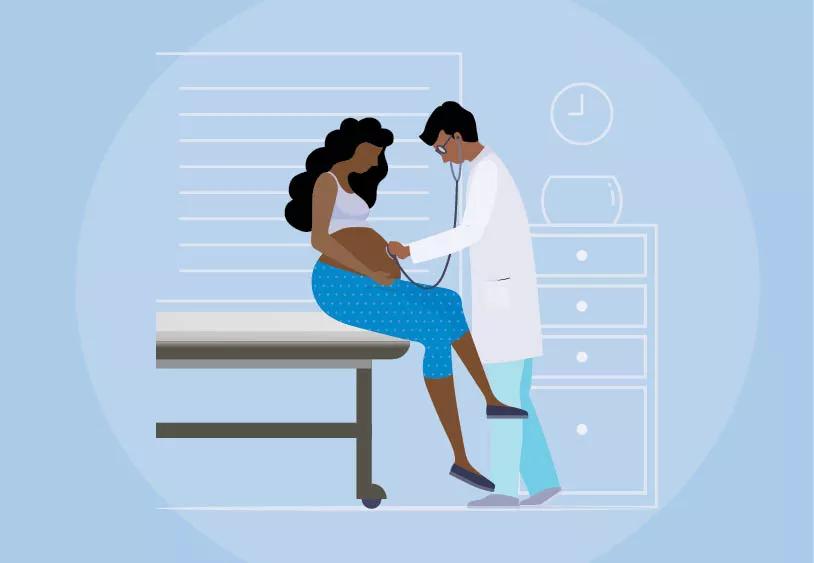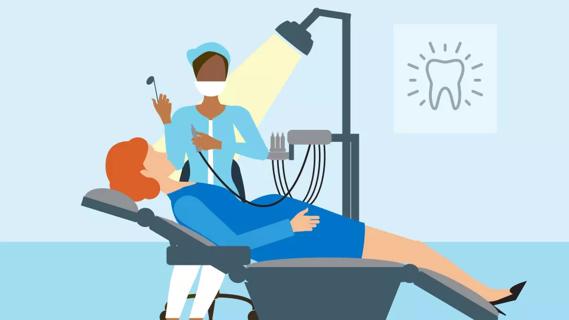Prenatal visits begin in week 4 and continue until delivery

A massive to-do list builds following the appearance of two lines on a home pregnancy test. (Congrats, by the way!) There’s soooo much to do over the next nine months — but few things will be as important as prenatal care.
Advertisement
Cleveland Clinic is a non-profit academic medical center. Advertising on our site helps support our mission. We do not endorse non-Cleveland Clinic products or services. Policy
Expect to become a regular at your healthcare provider’s office as you advance through pregnancy. These appointments begin just a few weeks after you become pregnant and continue right up until the big day.
For a healthy pregnancy, your doctor will probably want to see you on the following recommended schedule:
Each scheduled visit on the timeline comes with a checklist of sorts to help you progress toward a healthy outcome for you and your baby. They provide opportunities for assessment, education and support.
Let’s break down a typical appointment schedule with Ob/Gyn Stacie Jhaveri, MD, so you get an idea of what to expect.
How often you’ll visit: Once every four weeks
Expect your first visit to be a longer one as your healthcare provider gathers information to help guide your pregnancy. For starters, you’ll be asked detailed questions about your and your family’s health history.
This assessment lays the foundation for prenatal care visits throughout your pregnancy.
“We’re looking for health issues that could bring any sort of increased risk,” says Dr. Jhaveri. “If you’re on a medication, do you still need to be? If you have diabetes, is it under control? We talk about lifestyle, stress, diet, exercise. The list goes on and on.”
Advertisement
A thorough physical exam — including a pelvic exam — is also part of your initial visit. There’ll also be an evaluation (typically an ultrasound) to make sure your baby is growing well within your uterus.
You’ll also walk out of that first appointment with an exciting piece of information: A due date. (Or as many medical professionals call it, an EDC — estimated date of confinement.)
Visits will be shorter at the monthly check-ins that follow up to week 28. You can expect the following to take place at every appointment:
“This is all part of your ongoing assessment,” says Dr. Jhaveri. “Every one of these tests gives information that can be used to make sure you and your rapidly growing baby are as healthy as possible.”
Magical moments start popping up in this stretch, too. Fetal Doppler devices typically start picking up your baby’s heartbeat around 10 weeks, and will become a regular soundtrack to your prenatal visits.
Common tests during pregnancy also include a series of screenings that can provide information on your baby’s health. These include:
How often you’ll visit: Once every two weeks
As your third trimester begins, expect to begin spending much more time with your healthcare provider. The regular tests done in previous appointments will continue to monitor for any changes.
“Blood pressure can be normal, normal, normal … then all of a sudden it’s sky-high,” notes Dr. Jhaveri. “The closer we get to the end of your pregnancy, there’s more need for evaluation.”
A Tdap vaccine is typically encouraged in this period, too, to protect you and your baby from pertussis (whooping cough), as well as tetanus and diphtheria. Ditto for the Rh0 immune globulin shot to treat possible blood protein incompatibility.
Education also continues, with new information that fits the moment: “We tailor our counseling to where you are in your pregnancy, focusing on what you can expect and any warning signs to look for at that particular time period,” says Dr. Jhaveri.
How often you’ll visit: Once a week
You’re in the home stretch now. Visits to your doctor’s office are more frequent, as preparations for the big day come into sharper focus.
Your baby’s position will be checked to determine what direction they’re facing and your cervix will be checked for dilation. Expect questions and discussions about contractions, leaking fluid and bleeding, says Dr. Jhaveri.
Advertisement
A test for group B strep (GBS) is also routine at this point in the process. GBS can be passed on from parent to baby and cause life-threatening infections in newborns. If found, antibiotics given during labor can help prevent GBS from spreading to your baby.
Here’s the thing with the prenatal schedule above: It can change, especially if you’re pregnancy or health situation is one that demands additional monitoring, says Dr. Jhaveri. This could apply to you if:
If you’re pregnant, you’ve probably got a lot of questions. Ask them, says Dr. Jhaveri.
“Feel empowered when you walk into every appointment,” she says. “We’re here to help you take care of yourself and your baby.”
Advertisement
So, come to your visits with a list of questions and talk openly about any concerns. “Having a baby can be an emotional and scary process,” says Dr. Jhaveri. “But going to regularly scheduled prenatal visits can really help minimize a lot of your fears. You’re coming to a supportive environment. Use that to your advantage.”
Advertisement
Learn more about our editorial process.
Advertisement

Talk with them about their new sibling early and often

Dental care is not only safe during pregnancy, but it’s also highly recommended

A healthy pregnancy diet includes good amounts of folic acid, DHA, calcium and more

Always talk with your doctor for advice, too

Healthcare providers recommend waiting until week 13 to dye your hair, just to be safe

There’s only one proven way to stack the deck in favor of a boy or a girl

Having a baby after a loss can bring unexpected emotions

Your second-trimester is usually the best time to travel

Type 2 diabetes isn’t inevitable with these dietary changes

Applying a hot or cold compress can help with pain